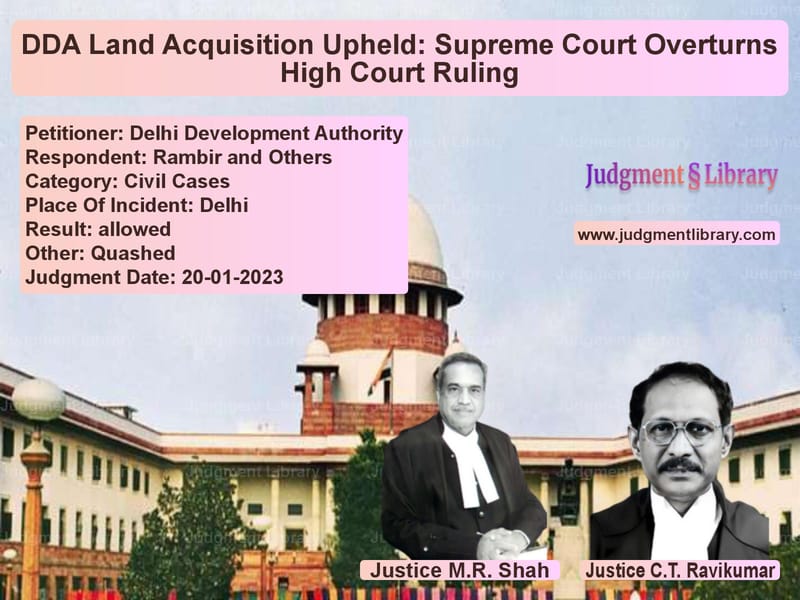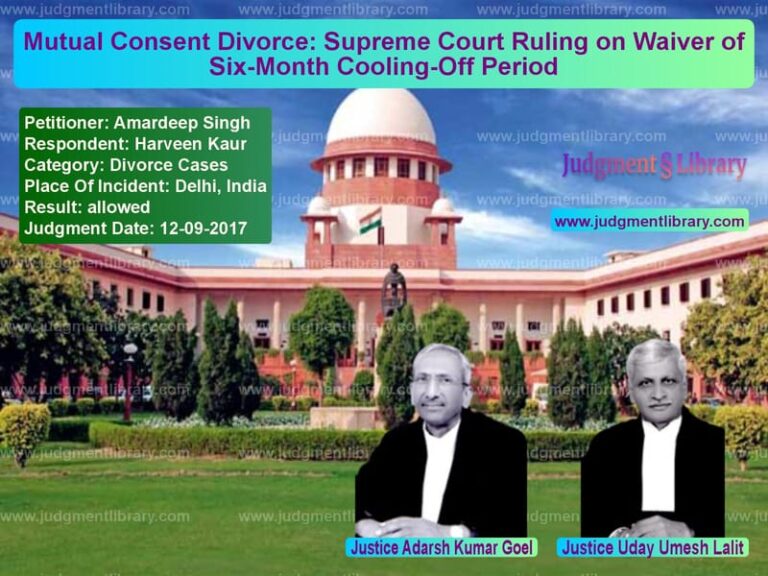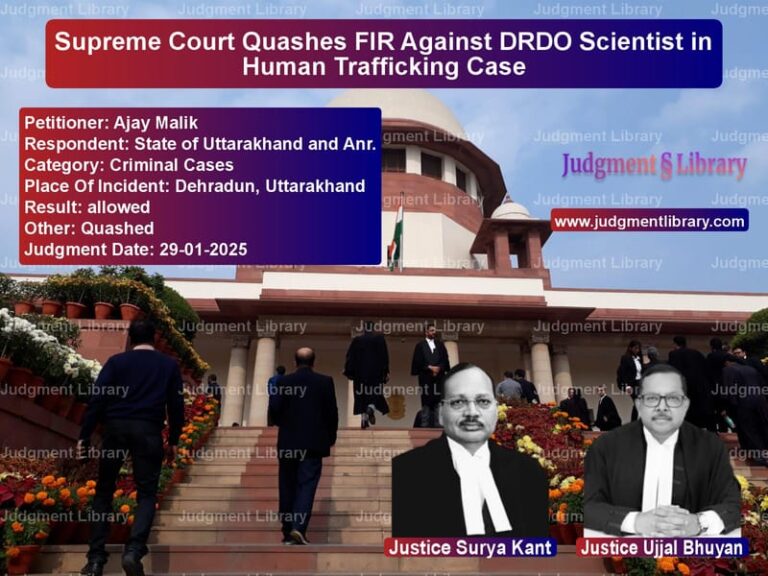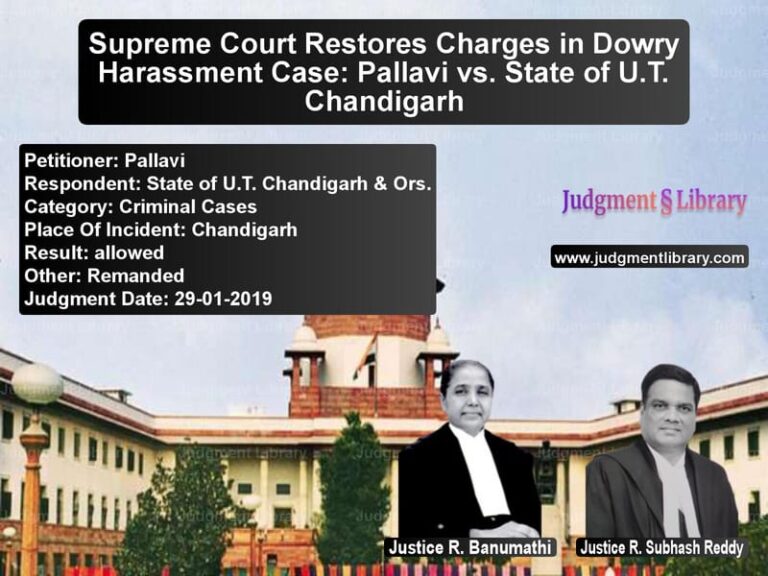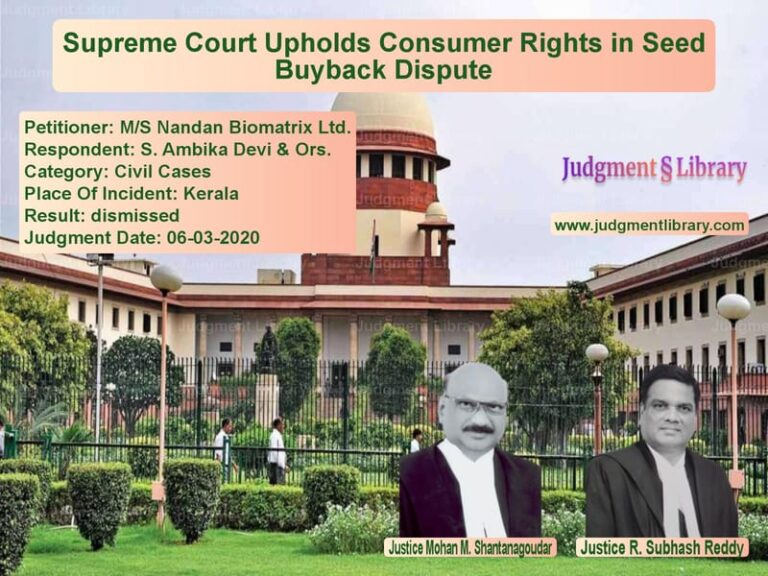DDA Land Acquisition Upheld: Supreme Court Overturns High Court Ruling
The Supreme Court of India recently ruled in the case of Delhi Development Authority (DDA) vs. Rambir and Others, addressing the validity of land acquisition under the Land Acquisition Act, 1894, and the applicability of Section 24(2) of the Right to Fair Compensation and Transparency in Land Acquisition, Rehabilitation and Resettlement Act, 2013. The case revolved around whether acquisition proceedings had lapsed due to non-possession of the land by the authorities.
Background of the Case
The dispute originated when landowners filed a writ petition before the Delhi High Court in 2017, claiming that their land acquisition had lapsed due to the authorities’ failure to take possession and compensate them. The High Court ruled in favor of the landowners, declaring that the acquisition had lapsed under Section 24(2) of the 2013 Act.
The DDA, challenging this decision, appealed to the Supreme Court, arguing that possession had been taken, and the High Court had misinterpreted the law.
Arguments by the Appellant (DDA)
- The DDA contended that possession of the land was taken on March 21, 2007, as documented in a possession report.
- The High Court misinterpreted Section 24(2) by ignoring the fact that formal possession was completed through the Land Acquisition Collector (LAC).
- Under the Supreme Court’s ruling in Indore Development Authority vs. Manoharlal (2020), the lapse provision applies only if both possession has not been taken and compensation has not been paid.
- Since possession was legally taken, there was no ground to declare the acquisition proceedings lapsed.
Arguments by the Respondents (Landowners)
- The landowners argued that physical possession had not been taken, as they continued to cultivate the land.
- They maintained that compensation had not been paid, which warranted a lapse under Section 24(2).
- The High Court had rightly found that the authorities’ failure to take physical possession invalidated the acquisition.
Supreme Court’s Observations
- “The word ‘or’ used in Section 24(2) between possession and compensation must be read as ‘nor’ or as ‘and’—meaning that the lapse occurs only if neither possession has been taken nor compensation has been paid.”
- “The possession report dated March 21, 2007, prepared by the LAC, is valid evidence that possession was legally taken.”
- “Once possession is taken and documented, the land vests with the government, and Section 24(2) does not apply.”
- “Failure to pay compensation does not automatically lead to a lapse if possession has been taken.”
- “The High Court’s ruling contradicts the Constitution Bench ruling in Indore Development Authority vs. Manoharlal, which clearly established that non-payment of compensation alone does not invalidate the acquisition.”
Final Judgment
- The Supreme Court allowed the appeal and set aside the High Court’s judgment.
- The Court held that since possession was taken, the acquisition proceedings had not lapsed under Section 24(2).
- It ruled that the landowners’ claims were unsustainable under the established legal precedent.
- The DDA retained ownership of the acquired land.
Legal Precedents Considered
- Indore Development Authority vs. Manoharlal (2020): Established that Section 24(2) applies only if both possession has not been taken and compensation has not been paid.
- Pune Municipal Corporation vs. Harakchand Misirimal Solanki (2014): Addressed issues of compensation in land acquisition but was later overruled by the Indore Development Authority case.
- Shiv Kumar vs. Union of India (2019): Clarified that once possession is taken, the land vests in the government.
Implications of the Judgment
- The ruling reinforces that formal possession, once taken, is sufficient to validate land acquisition.
- It prevents misuse of Section 24(2) by landowners seeking to invalidate old acquisitions based on technicalities.
- The decision provides clarity on the interpretation of possession in land acquisition cases.
- Government authorities can rely on documented possession reports to defend against land acquisition lapses.
Conclusion
The Supreme Court’s judgment in this case upholds the principle that land acquisition proceedings do not lapse solely due to non-payment of compensation if possession has been taken. The ruling strengthens legal certainty in land acquisition matters and ensures that government projects are not hindered by unnecessary legal challenges.
Petitioner Name: Delhi Development Authority.Respondent Name: Rambir and Others.Judgment By: Justice M.R. Shah, Justice C.T. Ravikumar.Place Of Incident: Delhi.Judgment Date: 20-01-2023.
Don’t miss out on the full details! Download the complete judgment in PDF format below and gain valuable insights instantly!
Download Judgment: delhi-development-au-vs-rambir-and-others-supreme-court-of-india-judgment-dated-20-01-2023.pdf
Directly Download Judgment: Directly download this Judgment
See all petitions in Property Disputes
See all petitions in Damages and Compensation
See all petitions in Judgment by Mukeshkumar Rasikbhai Shah
See all petitions in Judgment by C.T. Ravikumar
See all petitions in allowed
See all petitions in Quashed
See all petitions in supreme court of India judgments January 2023
See all petitions in 2023 judgments
See all posts in Civil Cases Category
See all allowed petitions in Civil Cases Category
See all Dismissed petitions in Civil Cases Category
See all partially allowed petitions in Civil Cases Category

